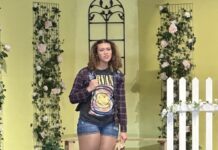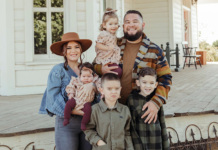“Raise your right hand.” Three hands went up, and three new Maricopa Unified School District governing board members were duly sworn into office by board president, Jim Chaston.
The swearing-in ceremony was the first agenda item at the governing board’s in-service training session Saturday. Taking the oath of office were Shannon Amos and Shannon Johns, who won seats in the November election, and Tim White, who was re-elected to the board at that time.

Board President Jim Chaston (second from right) administers the oath of office to the three new school district governing board members.

The new members of the Maricopa Unified School District governing board are (from left) Tim White, Shannon Amos and Shannon Johns.
Attorney Robert (Max) Jarrett of Udall, Shumway and Lyons of Willcox, who has represented school districts and public institutions for 32 years, told the governing board members that he first dealt with the Maricopa school district in 1983. “Some of you probably remember Mr. Crawford, the superintendent then,” Jarrett said.
“I was born in ’80,” noted Amos, getting a laugh from his colleagues.
Jarrett reviewed some aspects of the Open Meeting Law (OML) and its compliance. “I want to leave you with some things you can deal with and tell you ahead of time how you can deal with different issues,” explained the attorney. “This is a very stable district. You are experiencing growth and changes in population, but those issues are not unique to Maricopa,” he added.
OML questions are the number one type of query, usually about three a week, which Jarrett receives from board members in the various districts he represents. The intent of the OML is to keep public bodies from making decisions in secret. “You do not have to intend to violate the OML to violate it,” explained Jarrett, “and there is no statute of limitations.” For example, previous governing board members can never divulge confidential discussion from an executive session they attended – even after they are no longer members of the board.
According to the Arizona Revised Statutes (38-431) “all meetings of any public body shall be open meetings and all persons so desiring shall be permitted to attend and listen to the deliberations and proceedings. All legal action of public bodies shall occur during a public meeting.”
A meeting is defined as a “gathering in person or through technological devices of a quorum of members of a public body.” With a five-person governing board, a quorum consists of three individuals. When at least three of the five members discuss anything relative to the district, that is considered a “meeting;” if not conducted publicly, there is a violation of the OML. Each violator is subject to a fine not to exceed $500 per incident. They may also have to pay a successful plaintiff’s attorney fees and could be removed from office as well.
“It is better to be safe than sorry,” noted Jarrett, explaining that when three or more governing board members attend a groundbreaking ceremony, a sporting event or even graduation to hand out diplomas, it is wise to advertise that fact that a quorum may be present. Notices of open meetings and agendas for them must be posted not more than 24 hours prior to those meetings.

Governing board members study the Open Meeting Law requirements during their in-service training on Saturday.
The use of e-mails and conference calls among a quorum of board members is considered a meeting. “A board member may not propose legal action in an e-mail.” One-way e-mail communication is allowed, but the message cannot be passed on to a third board member, especially if the e-mail contains commentary that has been added. Board members who receive parental requests or complaints should forward them to the Superintendent for distribution to the entire board.
The OML also applies to site councils or any advisory committees that the board has both authorized and then appointed members to serve on
.
Jarrett also reviewed timelines and minimum requirements for student disciplinary hearings that come before the school board.
Superintendent Dr. John Flores spent the afternoon session discussing “boardsmanship,” the use of proper board protocol and procedures, for the governing board and its two new members.

![‘Best moms’ InMaricopa recognized Best Mom's 2024 photo taken at Karsten's Ace Hardware on May 11th, 2024. [Bryan Mordt]](https://www.inmaricopa.com/wp-content/uploads/2024/05/Best-Mom-2024-1-218x150.jpg)





![Maricopa sheds tears amid Maui wildfires that killed dozens For Maricopa resident Janelle Gomez, the sorrow mirrors the loss of a family member. [Brian Petersheim]](https://www.inmaricopa.com/wp-content/uploads/2023/08/Gomez-218x150.jpg)
![Embracing Freedom: Celebrating the Fourth of July Councilmember Vincent Manfredi at Great American 4th 2021 [Victor Moreno]](https://www.inmaricopa.com/wp-content/uploads/2023/07/2021-Great-American-4th-e1688414543522-218x150.jpg)



![Traffic change to reduce backup at Villages intersection The intersection at Butterfield Parkway and West Edison Road on May 10, 2024. [Brian Petersheim Jr.]](https://www.inmaricopa.com/wp-content/uploads/2024/05/PJ_5644-218x150.jpg)
![Gila River Bridge construction to begin Monday A screenshot showing an aerial view of the current Gila River bridges on Interstate 10 on an unknown date. [Arizona Department of Transportation]](https://www.inmaricopa.com/wp-content/uploads/2024/05/Screenshot-2024-05-10-154035-218x150.png)



![Southern soul on the spread at new food truck Owners Lakeesha Akins, Bridget Akins and Corey Jacobs stand in front of the Sunday's Soul Food truck at the Central Arizona College Maricopa campus on May 14, 2024. [Monica D. Spencer]](https://www.inmaricopa.com/wp-content/uploads/2024/05/spencer-051424-sundays-soul-food-grand-opening-web-01-100x70.jpg)